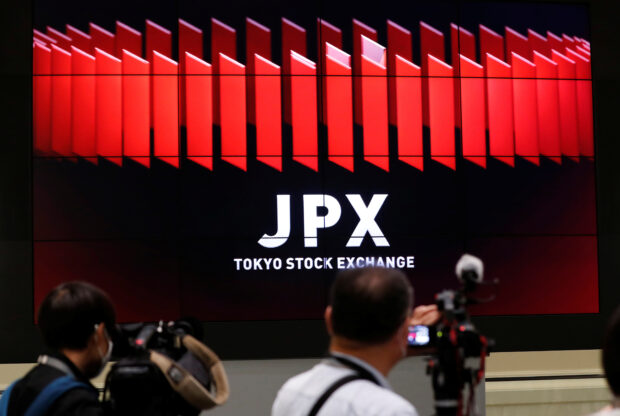Yen on intervention watch; Asia shares subdued

TV camera men wait for the opening of market in front of a large screen showing stock prices at the Tokyo Stock Exchange in Tokyo, Japan Oct 2, 2020. REUTERS/Kim Kyung-Hoon/File photo
SINGAPORE — The yen languished near its weakest in decades on Thursday though the threat of intervention from Japanese authorities kept investors leery of pushing the currency to a new low, while Asian stocks rose ahead of a key U.S. inflation reading.
Markets were largely rangebound ahead of Friday’s much-anticipated U.S. core personal consumption expenditures (PCE) price index data, the Federal Reserve’s preferred measure of inflation. Few markets will be open to digest the new reading, however, given the long Easter weekend in many countries.
Heightened focus was also on the yen, which was last little changed at 151.30 per dollar, having slid to a 34-year low of 151.975 in the previous session.
READ: Yen hits 34-year low ahead of key US inflation test
Japan’s three main monetary authorities held an emergency meeting on Wednesday to discuss the weak yen, and suggested they were ready to intervene in the market to stop what they described as disorderly and speculative moves in the currency.
That came after officials ramped up verbal warnings to stem the yen’s fall, with Finance Minister Shunichi Suzuki saying “decisive steps” will be taken against excessive currency moves.
Japanese authorities last intervened to support the yen in 2022, when they also used phrases such as “deeply concerned” and pledged to take “decisive steps” prior to intervention.
“Contrary to popular belief of 152 as the line in the sand, I think it’s more of the magnitude of the move that may matter,” said Christopher Wong, a currency strategist at OCBC.
Sliding yen a boon for Nikkei
“There is also a limit to how far verbal intervention can go. Nonetheless, the actual intervention risk is still high, if not higher.”
The sliding yen has been a boon for Japan’s Nikkei, which is up about 3 percent for the month thus far. It was last 1 percent lower, but remained not far from a record high.
READ: Yen’s drop to 1990 low lifts Nikkei; China stocks sag
In China, stocks were in the red, pressured by strong selling by foreign investors because of lingering concerns over the outlook for the world’s second-largest economy.
The blue-chip CSI300 index fell to a one-month low in early trade, while the Shanghai Composite index struggled below the psychologically key 3000-point mark and dipped 0.1 percent.
The yuan, also weighed down by expectations of further monetary easing from Beijing to shore up China’s fragile economic recovery, was little changed at 7.2270 per dollar, languishing near a four-month low.
Hong Kong’s Hang Seng Index barely budged, with a more than 1 percent jump in technology companies offsetting the drag from property names.
All that left MSCI’s broadest index of Asia-Pacific shares outside Japan 0.05 percent lower.
Dollar power
In currencies, the dollar was on the front foot, helped in part by comments from Fed Governor Christopher Waller, who said late on Wednesday there is no rush to ease interest rates.
While a more than 50 percent chance of a first Fed cut in June continues to be priced in, traders are placing greater bets for similar moves by the European Central Bank and the Bank of England that month.
Sweden’s central bank on Wednesday signaled there was a good chance of a series of rate cuts starting in May if inflation continued to drop towards its 2 percent target.
Against the greenback, the euro fell 0.1 percent to $1.0816, and sterling eased 0.12 percent to $1.26255.
The New Zealand dollar fell to its weakest level in four months at $0.5981.
“(The dollar) is still being swayed by the relative hawkishness of the Fed, taking all 19 policymakers together, and other central banks, who have tilted even more toward dovish in their tone recently,” said Thierry Wizman, global FX and rates strategist at Macquarie.
The renewed dollar strength halted a blistering rally in gold that sent it to a record peak last week. The yellow metal eased 0.2 percent to $2,189.81 an ounce.
Oil prices meanwhile edged up, with Brent gaining 36 cents to $86.45 a barrel, while U.S. crude rose 44 cents to $81.80 per barrel.